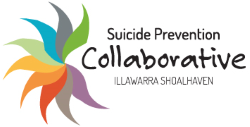When Jodi Bush lost her husband to suicide in 2013 she had no idea where to turn to for help.
Now seven years later she is part of a working group so others in that situation don't feel like they are alone.
"I had a one-year-old and five-year-old and the impact on my life is difficult to describe," she said.
"In that intense state of shock it was very difficult to navigate the process to know what kind of resources were out there. And to be very honest I didn't actually think there was any organised support out there for me. I had no idea of what I was able to access or what I should be doing. And I was basically doing it by myself."
When Mrs Bush was invited to join the Collaborative's Postvention For Families Working Group she gratefully accepted because she knew any effort to help others through such bereavement would make a real difference.
"It has been amazing to work with a bunch of really motivated people to try and bring together support," she said.
"When we came together we were really determined to make sure we did something meaningful. The big thing we wanted to achieve was to create a connected web of support for people who have been bereaved."
Mrs Bush said that included support for everyone from children to parents and carers, extended family members, schools, and the broader community. She said the working group wanted to provide resources that made it easier to navigate the process of seeking help.
A website was created with links to resources and information members wished they had been available to access when they lost a loved one.
The second step was to ensure there were resources that provide dedicated support and understanding for children who have been bereaved by suicide. And the third step was producing the videos.
There are nine videos of local people sharing deeply personal stories about grief, loss and recovery, and two compilation videos where people with lived experiences of bereavement after a loved one's suicide, talk about what helped them get through, and what you can say to someone recently bereaved.
The campaign is the result of a joint project where the working group was supported by One Door Mental Health, COORDINARE - South Eastern NSW Primary Health Network (PHN) and FinoComp.
The Collaborative was formed five years ago when a number of local organisations came together with a common objective or reducing suicide in the Illawarra and Shoalhaven.
Project manager Marie-Claude Lallier Beaudoin said suicide has a ripple effect across entire communities yet community intervention efforts tend to focus on preventing suicide, meaning that bereavement, and what happens after a suicide are often left out of the conversation.
"By sharing their stories openly and honestly, those featured in the videos aim to shine a light on bereavement after a suicide, and answer questions around 'What happens next?'"
In her video, Mrs Bush not only shares her personal story but highlights the importance of asking for help.
"I recognise it can be so hard to ask for help but being honest about what you need, gives the people who care about you a way to help, move forward and cope as well," she said.
The videos include people who have lost partners, parents, relatives, and friends.
"The aim of the videos and postvention campaign is to reassure people they are not alone in their emotional pain, and that support is available to help them process grief and deal with practical issues," Mrs Bush said.
If this article has raised any issues for you, please call Lifeline on 13 11 14 or the Mental Health Line on 1800 011 511.
Versions of this article were featured in the Illawarra Mercury, The Lake Advertiser Times, Goulburn Post, and many other publications!
